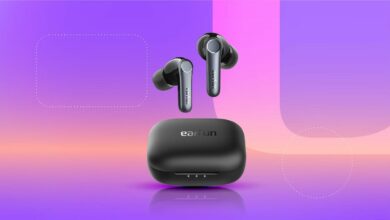Best True Wireless Sports Earbuds With Ear Hooks for 2024
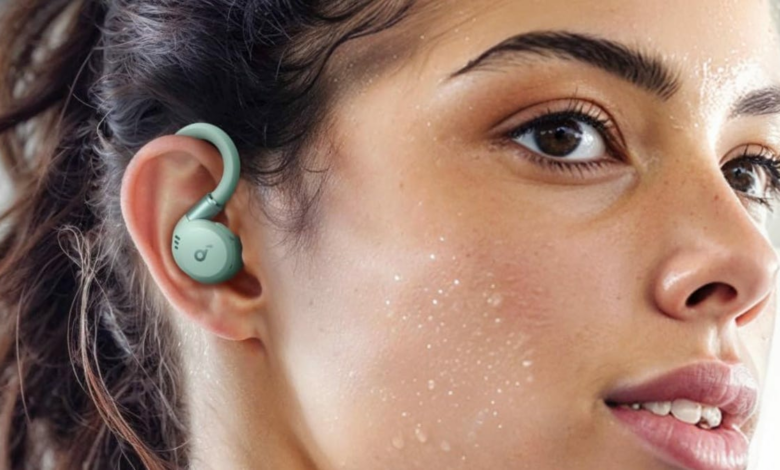





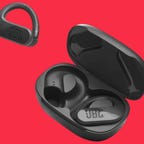

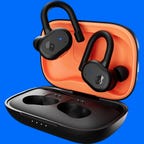
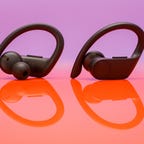
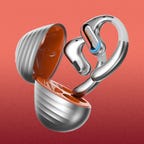




Best new open earbuds with an innovative clip-on design
Bose Ultra Open Earbuds

Best innovative charging case for earbuds with hooks
OneOdio OpenRock Pro
What are the best true wireless sports earbuds with ear hooks?
Sometimes a good earbud fits your situation better than even the best over-the-ear headphones can. For active people, it’s much easier to run, swim, cycle or perform many other exercises with earbuds in instead of over your head. In general, earbuds are lighter and easier to carry around. However, what may come to mind when thinking about these activities is the earbud falling out of your ear. Lost earbuds are common. Luckily, earbuds with ear hooks can solve this problem. The hooks provide extra support for holding it onto your ears, making for a secure fit and providing a better, worry-free experience when exercising with a lot of quick movements.
Given the variety of models available, it’s hard to name one model as the best overall, but a few stand out from the pack. For instance, the Bose Ultra Open Earbuds — which hook on your ears, not over them — and the Shokz OpenFit are our top picks for their sound, design and fit. I also like the new Soundcore by Anker X20 and 1More Fit SE S30 as top-value picks.
If you’ve lost a lot of AirPods, ear hooks may be your best bet. Not everyone will enjoy wearing earbuds with ear hooks, but they offer an extra level of security because their around-the-ear design can keep them from falling off your head. This is an important feature if you wear earbuds for running, biking, swimming, dancing and other activities that involve a certain amount of head jostling. That movement can lead to a bud slipping out of your ear and possibly getting lost, which can be a costly affair.
I’ve spent years testing dozens, if not hundreds, of sports headphones and earbuds while running. When picking the best, we need to look at models designed to stay in your ears or on your head, even when you’re moving at a fast pace. The ability to fit snugly is important, and so is your safety, which is why we look for headphones and earbuds that will let you hear the outside world and traffic.
Here’s a look at the best earbuds with ear hooks, all of which we’ve tested. Most of them are affordable, with most costing less than $100. We’ll update this list as new sports earbuds hit the market.
Read more: Best workout headphones
Best sports earbuds with ear hooks of 2024
The Bose Ultra Open Earbuds have one of the most unusual designs of any earbuds I’ve tested over the last several years. They literally clip onto the side of your ears, kind of like earrings, and their open design has micro speakers that fire sound into your ears while still being able to hear what’s happening around you. At $299, they’re somewhat overpriced, but otherwise, there’s a lot to like about them, including a surprisingly comfortable, secure fit and very good sound quality for open buds.
The Soundcore Sport X20 has some nice upgrades over Anker’s original Soundcore X10 earbuds. They include an improved design, adaptive noise canceling, superior battery life, slightly better sound and multipoint Bluetooth pairing. Like the previous model, these have an interesting design with rotating swiveling ear hooks. They don’t swivel as much as the X10’s ear hooks, which is a good thing (they stayed on my ears very securely). I also liked that the charging case has a smaller footprint than a lot of buds with ear hooks.
Fully waterproof and dust-proof with an IP68 rating, the X20 has slightly larger drivers than the X10 (11mm instead of 10mm). As long as you get a tight seal from the included ear tips (you get 5 sizes), they’re able to deliver good sound with punchy bass and good detail. They lack a bit of clarity, particularly at higher volumes (there was a touch of distortion), and the noise canceling isn’t as good as Sony or Bose’s noise canceling. But the buds are affordable and a good value overall.
As for battery life, it’s rated at up to 12 hours with noise canceling off and 7 hours with it on. Voice-calling performance is also decent, athough not exceptionally good.

Photo Gallery 1/1

The Soundcore X20 has an upgraded design with improved performance.
Screenshot by David Carnoy/CNET
Shokz, the company formerly known as AfterShokz, has long been the leader in bone-conduction headphones. Models like the OpenRun Pro, which deliver sound to your ear through your cheekbones, are popular with runners and bikers who like to leave their ears open for safety reasons. However, Shokz’s new OpenFit model, the company’s first true wireless earbuds, doesn’t use bone-conduction technology. They have an open design that fires sound into your ears using custom speaker drivers, which Shokz dubs “air conduction” technology.
I was impressed by how lightweight (8.3 grams) and comfortable they are. They have one of the best ear-hook designs I’ve tried (Shokz calls it a Dolphin Arc ear hook). It’s soft and offers just the right amount of flexibility to conform to the shape of your ear, with “dual-layered liquid silicone that provides a pliable fit,” according to Shokz. The earbuds also sound quite good for open earbuds, although not quite as good as Cleer’s Arc 2 Open Ear Sport earbuds which also have an ear-hook design.
1More makes a couple of open sports earbuds with ear hooks. The Fit S50 buds are the flagship ($120) and feature a little better sound than the Fit SE S30, have a more premium design and are fully waterproof (IPX7 rating). I like the fit a little better on the step-down S30, which is IPX5 splash-proof (can sustain a spray of water) and costs half the price, making it a better value.
The case is bulky and feels a little cheap (the lid is flimsy) but the buds themselves seem sturdily built and the ear hooks are nice and flexible. They have 14.2mm drivers that output decent but not great sound (there’s a bit of distortion at higher volumes), which is par for the course for these types of open buds that sit on top of your ears and fire sound into them. They’re also good but not great for voice calling. A companion app for iOS and Android allows you to tweak the sound with an equalizer and you can update the buds’ firmware. The buds are available in black or white and offer up to 10 hours of battery life at moderate volume levels.
The Soundcore by Anker AeroFit Pro are among the best open-ear “air conduction” earbuds, with a premium look and feel, and are comfortable to wear. (I had no problem keeping them on my ears while running or working out.) On the downside, they’re expensive, but they do feature strong audio quality for these types of earbuds, with ample bass and volume, plus decent clarity. They’re good for making calls (they do a pretty good job reducing background noise reduction) and also offer strong battery life, up to 14 hours at moderate volume levels.
While they don’t have ear-detection sensors, I liked that they have physical buttons to control playback and also come with a cord, should you want to turn them into neckband-style wireless headphones. It’s also worth noting that they have a spatial audio feature and offer the LDAC audio codec for devices like Android smartphones that support Bluetooth streaming.
Anker’s standard AeroFit fit model ($100) has smaller drivers (14mm versus 16.2mm for the Pro), so it doesn’t sound quite as good and also has a battery life rating of 11 hours. However, those buds are fully waterproof with an IPX7 rating, while these are splash-proof with an IPX5 rating.
JBL has upgraded its ear-hook style sport earbuds for 2023. Available in black or white, the Endurance Peak 3 buds offer better battery life (up to 10 hours with four extra charges in their case) improved voice-calling performance and an IP68 rating that makes them fully water- and dust-proof. They also have an Ambient Aware transparency mode and Talk Thru mode that can automatically lower your music’s volume level and open up the buds to the outside world. That means you can have a conversation with someone without removing the buds from your ears.
They stayed on my ears very securely during runs and I thought they sounded quite good, though they do have a bit of bass push (i.e. they have powerful bass). Just be aware that if you don’t get a tight seal, sound quality will be significantly worse. Also, like other earbuds with ear-hook designs, the case is on the beefy side. That said, the buds do seem durable and if you get a good fit, they’re an excellent and less pricey alternative to the Beats Powerbeats Pro. I also thought the touch controls worked well; I was easily able to toggle through the sound modes.
Cleer’s original Arc earbuds were solid sport earbuds that featured decent sound for open-style buds that sit on top of your ears and fire sound into them. This new-for-2023 model steps up the sound quality and offers additional refinements and feature upgrades, including a new “enhanced” charging case with UV sterilization and multipoint Bluetooth connectivity (Bluetooth 5.3), all of which make for a significantly improved product.
Cleer says the Arc 2 Sport buds feature “greater flexibility for improved comfort,” and I did find them more comfortable to wear than the original Arcs. That said, not everyone loves this style of open earbuds, which lets sound in so you can hear ambient sound around you for safety purposes.
With a new six-axis motion sensor, you can actually control the buds with head gestures — you answer calls by nodding and skip tracks forward by turning your head to the right and skip a trackback by turning your head left. Thankfully, those motion controls can be turned off if you don’t want to use them.
These are among the first buds to support Qualcomm’s aptX Lossless format if you’re one of the few to have an Android device that supports that audio codec (plenty of Android phones support aptX Adaptive). Since these aren’t high-end noise-isolating earbuds, you probably won’t be able to tell the difference in sound quality — I couldn’t — but all that aside, these do sound very good for open-style earbuds. They lack a bit of oomph to their bass but they’re punchy enough, offer good clarity and don’t distort at higher volumes. They also played sufficiently loud.
They have an IPX5 water- and sweat-resistance rating, which means they can withstand a sustained spray of water and battery life is very good at up to eight hours on a single charge. In addition, there are a little more than three additional charges in the slim but still somewhat bulky charging case. It’s big compared to an AirPods charging case, but svelte compared to other cases that house this style of earbuds.
These offer respectable performance for voice calls, but callers did say they heard a certain amount of white noise when I spoke to them from the noisy streets of New York — that whooshing sound is the by-product of the earbuds’ noise-reduction efforts.
With so many new wireless earbuds and headphones being released on what seems likely a weekly basis, it’s not easy for companies to differentiate their products in the marketplace. Skullcandy hopes its new voice-driven platform, Skull-iQ Smart Feature Technology, will do just that. Similar to the Apple AirPods’ “Hey Siri” feature, Skullcandy’s version allows you to say “Hey, Skullcandy” to issue hands-free voice commands without touching a button. Skull-iQ debuts on the sports-oriented Push Active, and the $100 Grind Fuel, which will be firmware updatable via the Skullcandy App.
With their ear-hook design, they’re essentially a more affordable version of the Beats Powerbeats Pro and they fit my ears slightly better than the Powerbeats Pro. I’m not usually a fan of ear-hook style buds, but this is one of the better ones.
The Push Active True earbuds are equipped with Bluetooth 5.2, are IP55 splashproof, have built-in Tile Finding Technology and are rated for up to 10 hours of battery life on a single charge at moderate volume levels.
The Beats Powerbeats Pro earbuds have been on the market for several years but remain popular and are now available in several color options. Their jumbo charging case is a notable drawback, but they offer many of the same features as Apple’s original AirPods Pro (they’re equipped with Apple’s H1 chip) but have better sound so long as you get a tight seal (they should fit most — but not all — ears well). There’s no active noise canceling but battery life is strong at up to 9 hours and they’re IPX4 splash-proof.
Note that the Powerbeats Pro are frequently on sale, so you should only buy them if they’re substantially discounted.
The OpenRock Pro buds aren’t so different from a lot of open sports earbuds with ear hooks that cost a little more than $100, but their charging case is different. Most of these types of buds lie flat in their charging case. These slide vertically into their charging compartments and the case closes from the top — a little like a Zippo lighter.
They’re sturdily built, comfortable to wear and feature good sound for open ear buds with ample bass thanks to 16.2mm drivers. Voice-calling performance is also decent — they have four microphones. Available in black or silver, they’re IPX5 water-resistant (they can withstand a sustained spray of water) and have excellent battery life — up to 19 hours at moderate volume levels.
There are several open earbuds on Amazon with an ear hook design that’s similar to that of the Oladance OWS2 buds. But these buds look and feel a little more premium than many of those. This second-gen model includes some upgrades, including Bluetooth 5.3, multipoint Bluetooth pairing capabilities and increased battery life (up to 19 hours on a single charge at 50% volume).
I found them comfortable to wear and they have a little bit bigger sound than some of these open sport buds (they have 16.5 mm drivers), though they do distort a tad at higher volumes. I also liked their glossy finish in the orange color I tried. The case is slim but a bit long, and the buds are a little pricey at $150, but overall they performed well and seem durable. They’re IPX4 splashproof.
Oladance also makes the newer OWS Pro, which have a lighter design and a smaller charging case, but those buds cost $230.
Budget
Before anything else, you’ll want to figure out how much you’re willing to spend on new wireless sports buds with ear hooks. The quality of value-priced earbuds and headpones continues to improve, so you can find good affordable sports buds for less than $75. The premium models, which offer better build quality and performance, tend to cost more than $100 and sometimes more than $150.
Noise-isolating or open design
Sports buds with ear hooks are available in a couple of styles. Some come with silicone tips that are designed to create a tight seal in your ear and keep sound out (they have a noise-isolating design). Others have an open design with the buds resting on top of your ears, firing sound into them. The noise-isolating style typically gives you better sound with stronger bass while the open design has the advantage of allowing sound in for safety reasons.
Fit, aka comfort
It’s key that sports earbuds fit your ears not only comfortably but securely. They should offer a comfortable fit that allows you to wear the earbuds for long periods without any irritation. Since all the buds on this list have ear hooks, they should stay on your ears well. Some will fit your ears more comfortably than others.
Durability
You want sports buds that hold up well over time, so look for models that we note have sturdy build quality and a good water-resistance rating.
Return policy
It’s critical to buy your sports at a retailer that has a good return policy, in case you have buyer’s remorse. Some people who are having trouble deciding between two models sometimes buy both, try them out for a few days and then return one.
We test true-wireless earbuds based on five key criteria, comparing similarly styled and priced models. These criteria are design, sound quality, features, voice-calling performance and value.
- Design: We assess not only how comfortable the earbuds fit (ergonomics) but their build quality and how well the controls are implemented. We also look at water- and dust-resistance ratings.
- Sound quality: We evaluate sound quality by listening to a set playlist of music tracks and comparing the earbuds to top competing products in their price range. Sonic traits such as bass definition, clarity, dynamic range and how natural the headphones sound are key factors in our assessment.
- Features: Some great-sounding earbuds aren’t loaded with features, but we do take into account what extra features are on board. These include everything from noise-canceling and transparency modes (ambient sound mode) to special sound modes to ear-detection sensors that automatically pause your music when you take the headphones off your ears.
- Voice-calling performance: When we test voice-calling performance, we make calls in the noisy streets of New York and evaluate how well the earbuds reduce background noise and how clearly callers can hear your voice.
- Value: We determine value after evaluating the strength of the earbuds against all these criteria and what the buds are able to deliver compared to other models in their price class.
Baseus Eli Sport 1: The Eli Sport 1 can be had for around $70. While they may not sound quite as good as some of the premium open earbuds out there — there can be a touch of distortion at higher volumes with bass-heavy tracks — they sound quite decent for their modest price and I found them comfortable to wear. They look more premium than their price would indicate. They have 16.2mm drivers, are IPX4 splash-proof and are rated for up to 7.5 hours of battery life at moderate volume levels.
Samsung Galaxy Buds FE: Carrying a list price of around $80, Samsung’s 2023 Galaxy Buds FE feature a single driver (Samsung isn’t saying what size it is), three mics on each earbud and active noise canceling. They charge in a case that’s the same size and shape as what you currently get with all of Samsung’s latest Galaxy Buds, including the Galaxy Buds 2 and Galaxy Buds 2 Pro. And they look a lot like an updated version of Samsung’s discontinued Galaxy Buds Plus earbuds, which also came with a set of swappable fins that helped create a secure, comfortable fit. Like those buds, the Galaxy Buds FE are sweat-resistant with an IPX2 water-resistance rating that protects against splashes.
Bose Frames (Tempo): The Bose Frames are one of those products you have to try to fully appreciate — or dismiss. The concept is that you’re getting a decent pair of sunglasses with a pair of headphones that don’t actually go in your ears. Rather, integrated micro speakers in each arm direct a beam of sound to your ears. That design could be appealing to people who don’t like having headphones in or on their ears and also offers a degree of safety for runners and bikers who want their ears open to the world.
Jabra Elite 8 Active: Equipped with six microphones instead of four, slightly improved adaptive noise canceling and wind-reduction technology along with a higher durability rating, the Elite 8 Active looks, feels and performs like a modestly upgraded version of the Elite 7 Pro and Elite 7 Active. Jabra is billing them as the “world’s toughest earbuds,” and based on our tests (they survived several drops without a scratch), that may very well be true.
Soundpeats Air3 Deluxe HS: What makes these Soundpeats Air3 Deluxe HS buds special is that they sound surprisingly good for open earbuds — they’re pretty close to what you get from Apple’s AirPods 3 for sound. On top of that, they support Sony’s LDAC audio codec for devices that offer it. Not too many cheap open earbuds have good sound, but these Soundpeats have good bass response and clarity. They’re also good for making calls and have a low-latency gaming mode. Battery life is rated at 5 hours at moderate volume levels, and these are IPX4 splash-proof.
Are earbuds with ear hooks better than earbuds with wingtips for sports?
What are the downsides to earbuds with ear hooks?













